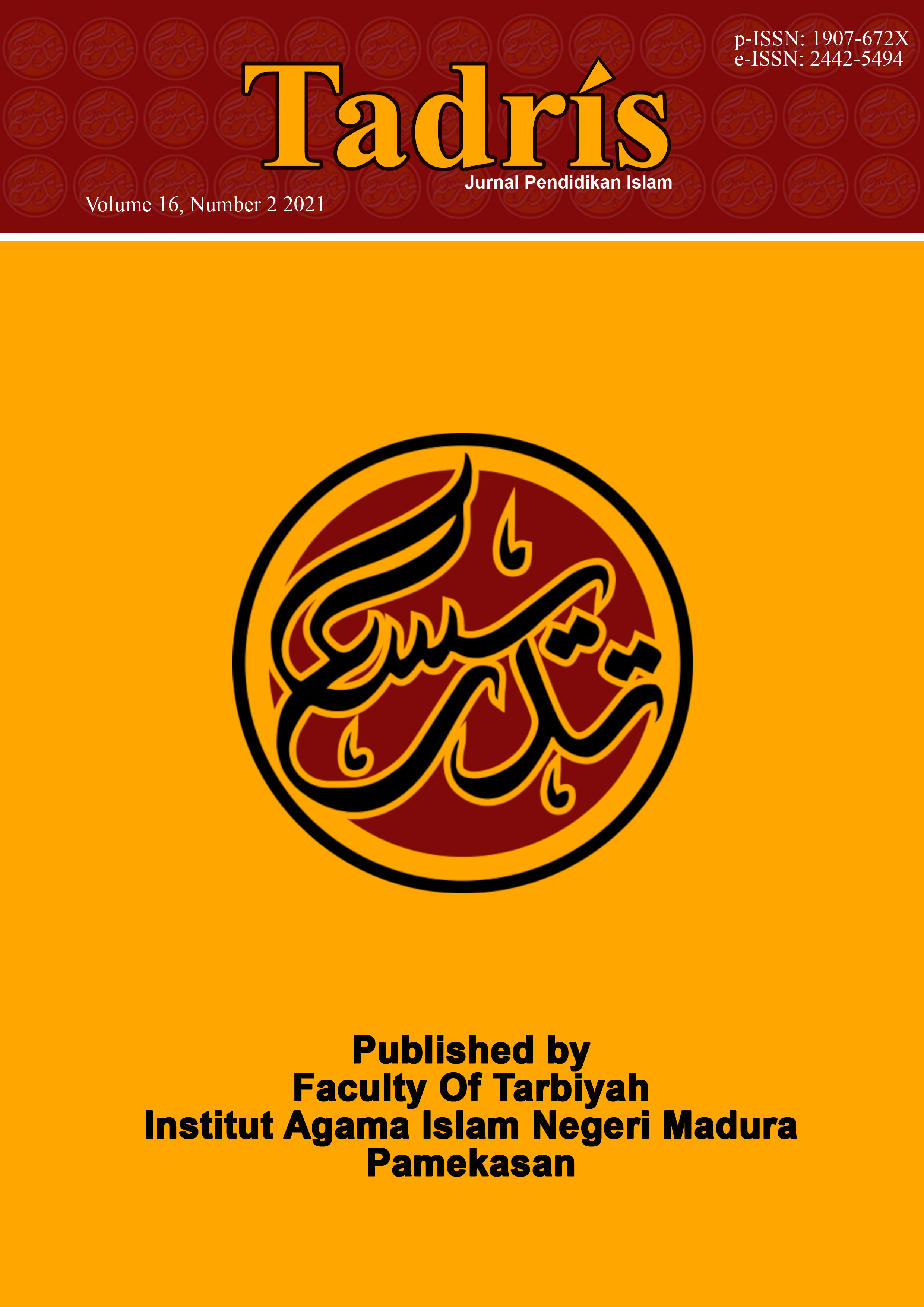Islam dan Piranti Manusia Modern di Era Digitalisasi : Kajian Konstruk Pendidikan Islam
 Abstract views: 750
,
Abstract views: 750
,
 PDF downloads: 828
PDF downloads: 828
Abstract
In this piper the author tries to formulate Islamic education in overcoming the spirituality crisis of modern humans whose foundation is scientism. It is hoped that the Islamic spirit can fill the fragility of the human heart and soul to return to the path of Islamic guidance from the frenetic hedonism and hegemony of the digitalization era. The method used in this research is library research and multy stake random sampling survei, the data collection is taken from books, magazines, newspapers, articles and so on, then analyzed using data analysis techniques. The research results describe; portrait of modern humans in the era of digitalization in the view of Islam, the tools needed by modern humans in the era of digitalization and the construction of Islamic education in the era of digitalization. The results of this research are none other than one of the offers to manage all the potential possessed by every human person in the process of self-actualization in the era of digitalization and building relevant and humane Islamic education constructs.
Downloads
References
Arifin, Zaenal. “Metodologi Penelitian Pendidikan.” Jurnal Al-Hikmah 1, no. 1 (July 9, 2020). http://alhikmah.stit-alhikmahwk.ac.id/index.php/awk/article/view/ 16.
Bauer, Carrie, and Matthew J Gallagher. “Education for Humanity: Higher Education for Refugees in Resource-Constrained Environments through Innovative Technology.” Journal of Refugee Studies 33, no. 2 (June 1, 2020): 416–36. https://doi.org/10.1093/jrs/feaa040.
Busyairi, Ahmad. Tantangan Pendidikan Islam, Kumpulan Artikel. Yogyakarta: LPM-UH, 1987.
Chang, Chew Hung, and Gillian Kidman. “Dawn of a New Decade—What Can Geographical and Environmental Education Offer for the 2020s.” International Research in Geographical and Environmental Education 29, no. 1 (January 2, 2020): 1–6. https://doi.org/10.1080/10382046.2020.1691334.
Elhai, Jon D. “Non-Social Features of Smartphone Use Are Most Related to Depression, Anxiety and Problematic Smartphone Use.” Computers in Human Behavior, 2017, 8.
Elhai, Jon D., Mojisola F. Tiamiyu, Justin W. Weeks, Jason C. Levine, Kristina J. Picard, and Brian J. Hall. “Depression and Emotion Regulation Predict Objective Smartphone Use Measured over One Week.” Personality and Individual Differences, Examining Personality and Individual Differences in Cyberspace, 133 (October 15, 2018): 21–
https://doi.org/10.1016/j.paid.2017.04.051.
Farida, Meutia. “Perkembangan Pemikiran Tasawuf dan Implementasinya di Era Modern.” Substantia: Jurnal Ilmu-Ilmu Ushuluddin 13, no. 1 (April 1, 2011): 105–14. https://doi.org/10.22373/substantia.v13i1.4816.
Faridh, Tri Ahmad, and Mubaidi Sulaeman. “Emotional And Spiritual Intelligence (ESQ) of Children in Islamic Education in the Family Environment.” Didaktika Religia 6, no. 1 (2018): 51–66.
Fikri, Ali. “Pengaruh Globalisasi Dan Era Disrupsi Terhadap Pendidikan Dan Nilai-Nilai Keislaman.” Sukma: Jurnal Pendidikan 3, no. 1 (June 6, 2019): 117–36. https://doi.org/10.32533/03106.2019.
Franke, Thomas, Christiane Attig, and Daniel Wessel. “A Personal Resource for Technology Interaction: Development and Validation of the Affinity for Technology Interaction (ATI) Scale.” International Journal of Human–Computer Interaction 35, no. 6 (April 3, 2019): 456–67.
https://doi.org/10.1080/10447318.2018.1456150.
Franke, Thomas, and Mourad Zoubir. “Technology for the People? Humanity as a Compass for the Digital Transformation.” Wirtschaftsdienst 2020, no. 13 (2020): 4–11.
Freire, Paulo. Education as a Practice of Freedom. Duke University Press, 2018.
Haryati, Tri Astutik. “Modernitas Dalam Perspektif Sayyed Hossein Nasr.” JURNAL PENELITIAN 8, no. 2 (October 19, 2012). https://doi.org/10.28918/jupe.v8i2.84.
Muhajarah, Kurnia. “Krisis Manusia Modern Dan Pendidikan Islam.” Al Ta’dib 7, no. 2 (2018): 188–204.
Muzayanah, Umi. “Trend Beragama Remaja Era Milenial: Analisis Perilaku Siswa SMA Di Jawa Tengah.” FIKRAH 6, no. 2 (December 27, 2018): 261–82. https://doi.org/10.21043/fikrah.v6i2.4007.
Nabil, Muhammad. “Membumikan Tasawwuf Di Tengah Krisis Spiritualitas Manusia Abad
Modern Pandangan Sayyed Hossein Nasr.” Esoterik 4, no. 2 (December 17, 2018):
https://doi.org/10.21043/esoterik.v4i2.4049.
Nur, Iffatin, and Muhammad Ngizzul Muttaqin. “Bermedia Sosial dalam Perspektif Maqashid Syari’ah (Membangun Komunikasi di Media Sosial Berdasarkan Etika).” Palita: Journal of Social Religion Research 5, no. 1 (April 8, 2020): 1–14. https://doi.org/10.24256/pal.v5i1.1090.
Nurcholis, Ahmad. “Peran Tasawuf Dalam Merekonstruksi Krisis Spiritualitas Manusia Modern.” Sosio Religi, 2012.
Putra, Andi Eka. “Tasawwuf sebagai terapi atas modern spiritual Masyarakat Modern.” Al- Adyan: Jurnal Studi Lintas Agama 8, no. 1 (2013): 13.
Rijal, A. S., & Hakim, L. (2021). Etika Tasawuf Guru: Studi Pemikiran Imam Al-Ghazali Dan Syekh Muhammad Amin Al-Kurdi. TADRIS: Jurnal Pendidikan Islam, 16(1), 127-140.
Rusmin B., Muhammad. “Konsep Dan Tujuan Pendidikan Islam.” Inspiratif Pendidikan 6, no. 1 (June 1, 2017): 72. https://doi.org/10.24252/ip.v6i1.4390.
Sahibuddin, M. “Dinamika Tasawwuf dalam Dinamika Modern.” Jurnal Al-Ulum: Universitas Islam Madura 2 (2014): 15.
Subhi, Mohammad. “Desaklarisasi dan alenasi manusia dalam Peradaban Modern Prepektif Sayyed Husein Nasr” 11, no. 2 (2014): 11.
Copyright (c) 2021 TADRIS: Jurnal Pendidikan Islam

This work is licensed under a Creative Commons Attribution-NonCommercial 4.0 International License.
The journal operates an Open Access policy under a Creative Commons Non-Commercial 4.0 International license. Authors who publish with this journal agree to the following terms:
- Authors retain copyright and grant the journal right of first publication with the work simultaneously licensed under a
 Commons Attribution-NonCommercial 4.0 International License
Commons Attribution-NonCommercial 4.0 International Licensethat allows others to share — copy and redistribute the material in any medium or format, and adapt — remix, transform, and build upon the material.
- Authors are able to enter into separate, additional contractual arrangements for the non-exclusive distribution of the journal's published version of the work (e.g., post it to an institutional repository or publish it in a book), with an acknowledgement of its initial publication in this journal.
- Authors are permitted and encouraged to post their work online (e.g., in institutional repositories or on their website) prior to and during the submission process, as it can lead to productive exchanges, as well as earlier and greater citation of published work (see The Effect of Open Access).














